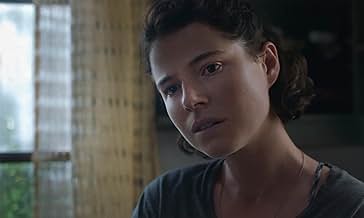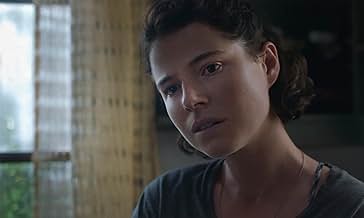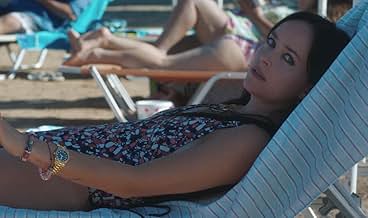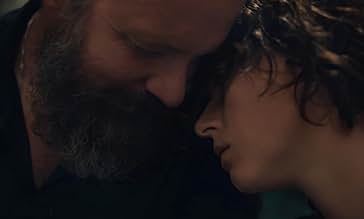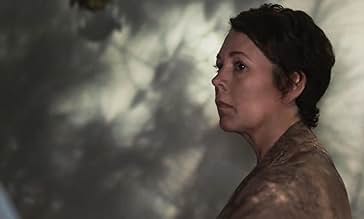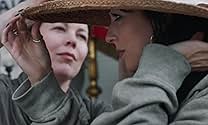A woman's beach vacation takes a dark turn when she begins to confront the troubles of her past.A woman's beach vacation takes a dark turn when she begins to confront the troubles of her past.A woman's beach vacation takes a dark turn when she begins to confront the troubles of her past.
- Director
- Writers
- Stars
- Nominated for 3 Oscars
- 41 wins & 114 nominations total
Ellie Mae Blake
- Martha
- (as Ellie Blake)
Athena Martin Anderson
- Elena
- (as Athena Martin)
- Director
- Writers
- All cast & crew
- Production, box office & more at IMDbPro
Featured reviews
When this film ended, I was left wondering what it was exactly that I just watched and felt like I was trying to find a deeper meaning within the film that I'm not even sure is really even there. Throughout the entire film, I was waiting for something to happen that would tie certain scenes together to make the story line more cohesive and make more sense and provide some sense of closure in regard to the plot and the actions of the main character. But at the end of the film, there I was... still waiting. There were scenes that were completely irrelevant to the story (for example, the scene with the hikers). I kept waiting for that scene to become relevant later in the film, but it never did. It was just "filler," I guess. As far as the acting goes, it was fine, as was the directing. I think the main failure of this film is the plot in general. Basically, it tries to build up a lot of intrigue (and does a decent job at that) but then in the end, you're still left struggling to find meaning and relevance and make connections that don't exist. And because of that, the film comes off as a bit pretentious due to its failed attempt to explore the main character's complex psychological state but even in that, it barely skims the surface.
Greetings again from the darkness. There are so many things that go unspoken about parenting, and first time writer-director Maggie Gyllenhaal specifically focuses her lens on the pressures of motherhood, by adapting the 2006 novel from the anonymous and talented and mysterious Italian writer Elena Ferrante. Of course, we are all aware of Ms. Gyllenhaal's fine work as an actor, yet it's almost beyond belief that this is her debut as a feature film director. The source material is strong, but Ms. Gyllenhaal, along with a terrific performance from Olivia Colman (Oscar winner, THE FAVOURITE, 2018), turn a coastline vacation into a mesmerizing psychological case study.
Ms. Colman proves yet again what a fine and versatile actor she is. Here she plays Leda, a divorced professor on solo holiday on a picturesque Greek island, staying in a refurbished lighthouse tended by longtime caretaker Lyle (Ed Harris). Leda is packing a satchel full of books and academia work, and is a bit perturbed when her isolated beach time is suddenly interrupted by a large and noisy family of vacationers from Queens. Being an observant loner, Leda eyes young mother Nina (Dakota Johnson) who is struggling with her daughter, as well as her husband and other family members. This triggers memories in Leda that are handled via flashbacks with a terrific Jessie Buckley (I'M THINKING OF ENDING THINGS, 2020) as young Leda, stressed out wife and mother to two daughters. She longs for her own space.
At face value, this appears to be a movie about a woman annoyed that she can't just enjoy a quiet holiday on the sandy beach as she reads her books. However, there are so many layers to the story and to Leda, that as viewers, we must remain on high alert to pick up all the queues and subtleties. Watching Nina with her daughter and husband sends Leda deep into her past ... a past that still haunts her to this day. At the same time, while gazing at Leda, Nina can't help but wonder if she is looking at her own future self.
Much of what we see (past and present) reinforces the isolation and frustration felt by so many mothers. It has nothing to do with loving one's kids, but rather maintaining one's sanity and self-being. There are a few key moments, including one that creates tension between Leda and the vacationing family, and another that immediately connects the two. Leda's past includes steps that would be considered taboo for any wife and mother, and the symmetry of her past and Nina's present are striking.
Peter Sarsgaard (director Gyllenhaal's real life husband) has a supporting role in the flashbacks, while Dagmara Dominczyk plays a critical role as Callie, part of Nina's large family. Bonus points are won with a Leonard Cohen reference (that may or may not be true), and also playing key roles here are a missing doll (connecting Leda's past and present) and the proper way to peel an orange. Cinematographer Helene Louvart works wonders balancing the beautiful setting with the not-always-beautiful actions of the characters. Especially potent here is the performance of Olivia Colman, who proves she can play most any role. It's also remarkable what first time director Maggie Gyllenhaal has accomplished here. This is a multi-layered, nuanced look at how relentless parenting can often feel overwhelming and may even lead to feelings of guilt later in life. It's rare to see such a raw look at the emotions behind what is often referred to as the joy of motherhood. The film leaves little doubt that the always-dependable actor Maggie Gyllenhaal is now one of the most interesting new filmmakers on the scene.
In select theaters on December 17, 2021 and on Netflix beginning December 31, 2021.
Ms. Colman proves yet again what a fine and versatile actor she is. Here she plays Leda, a divorced professor on solo holiday on a picturesque Greek island, staying in a refurbished lighthouse tended by longtime caretaker Lyle (Ed Harris). Leda is packing a satchel full of books and academia work, and is a bit perturbed when her isolated beach time is suddenly interrupted by a large and noisy family of vacationers from Queens. Being an observant loner, Leda eyes young mother Nina (Dakota Johnson) who is struggling with her daughter, as well as her husband and other family members. This triggers memories in Leda that are handled via flashbacks with a terrific Jessie Buckley (I'M THINKING OF ENDING THINGS, 2020) as young Leda, stressed out wife and mother to two daughters. She longs for her own space.
At face value, this appears to be a movie about a woman annoyed that she can't just enjoy a quiet holiday on the sandy beach as she reads her books. However, there are so many layers to the story and to Leda, that as viewers, we must remain on high alert to pick up all the queues and subtleties. Watching Nina with her daughter and husband sends Leda deep into her past ... a past that still haunts her to this day. At the same time, while gazing at Leda, Nina can't help but wonder if she is looking at her own future self.
Much of what we see (past and present) reinforces the isolation and frustration felt by so many mothers. It has nothing to do with loving one's kids, but rather maintaining one's sanity and self-being. There are a few key moments, including one that creates tension between Leda and the vacationing family, and another that immediately connects the two. Leda's past includes steps that would be considered taboo for any wife and mother, and the symmetry of her past and Nina's present are striking.
Peter Sarsgaard (director Gyllenhaal's real life husband) has a supporting role in the flashbacks, while Dagmara Dominczyk plays a critical role as Callie, part of Nina's large family. Bonus points are won with a Leonard Cohen reference (that may or may not be true), and also playing key roles here are a missing doll (connecting Leda's past and present) and the proper way to peel an orange. Cinematographer Helene Louvart works wonders balancing the beautiful setting with the not-always-beautiful actions of the characters. Especially potent here is the performance of Olivia Colman, who proves she can play most any role. It's also remarkable what first time director Maggie Gyllenhaal has accomplished here. This is a multi-layered, nuanced look at how relentless parenting can often feel overwhelming and may even lead to feelings of guilt later in life. It's rare to see such a raw look at the emotions behind what is often referred to as the joy of motherhood. The film leaves little doubt that the always-dependable actor Maggie Gyllenhaal is now one of the most interesting new filmmakers on the scene.
In select theaters on December 17, 2021 and on Netflix beginning December 31, 2021.
I learned of Olivia Colman when she played Queen Anne in "The Favorite" (and won an Oscar for the role). I later saw her on "Broadchurch", as well as seasons three and four of "The Crown". She also provided one of the voices in "The Mitchells vs. The Machines".
But now we have Ms. Colman in an intense role. She plays a woman on vacation in Greece whose stay is overshadowed by memories of the daughters whom she abandoned. "The Lost Daughter" both casts doubt on the supposed happiness of family life, and the presumed pleasantness of tourism, with the protagonist's mental state deteriorating as the movie progresses. Jessie Buckley as the protagonist's younger self is equally intense, almost as much as her character in "I'm Thinking of Ending Things".
Maggie Gyllenhaal's directorial debut is a fine one. I wouldn't call it a masterpiece - and it certainly won't be for everyone - but it's not a movie that you're likely to forget any time soon. Both Colman and Buckley received Academy Award nominations for their roles, with excellent support coming from Ed Harris, Dakota Johnson, Dagmara Dominczyk (Karolina on "Succession"), Paul Mescal and Peter Sarsgaard.
But now we have Ms. Colman in an intense role. She plays a woman on vacation in Greece whose stay is overshadowed by memories of the daughters whom she abandoned. "The Lost Daughter" both casts doubt on the supposed happiness of family life, and the presumed pleasantness of tourism, with the protagonist's mental state deteriorating as the movie progresses. Jessie Buckley as the protagonist's younger self is equally intense, almost as much as her character in "I'm Thinking of Ending Things".
Maggie Gyllenhaal's directorial debut is a fine one. I wouldn't call it a masterpiece - and it certainly won't be for everyone - but it's not a movie that you're likely to forget any time soon. Both Colman and Buckley received Academy Award nominations for their roles, with excellent support coming from Ed Harris, Dakota Johnson, Dagmara Dominczyk (Karolina on "Succession"), Paul Mescal and Peter Sarsgaard.
Elana Ferrante, the anonymous Sicilian author of "The Lost Daughter, has dedicated her entire career to the honest depiction of the complexities of what it means to be a woman. In this regard, Maggie Gyllenhall was wildly successful in her adaption of "The Lost Daughter", delivering a marvel of a screenplay that is able to tap the essence of Ferrante's work by offering an unflinching glimpse into the idealism of motherhood and then tearing it to shreds. The writing of Ferrante, infamously dense, is not easy source material to adapt into a cinematic format, instead of typical plot-driven fiction, she opts for a more heady and internally based story structure, which is why it's such a feat that Gyllenhall is able to make her script even remotely entertaining.
However, the script alone isn't what makes this movie good. It has a significant assist by three actresses: Olivia Colman in the titular role, Jessie Buckley as her younger half, and Dakota Johnson as a new mother of intrigue. Olivia Colman has clearly reached the new golden era of her career with stunning back-to-back performances: The Favorite, Flea Bag, The Crown, The Father, and now once again we find ourselves lauding her much deserved praise. Colman turns a mother, with plenty not to like, into a character that you just can't tear your eyes away from. Colman so deftly manages the swirl of emotions and outbursts of anger her character was prone to without ever showing her cards. Jessie Buckley, as her younger half, arguably gives the only warm performance in the entire film, a sharp decision in contrast to Colman's cold exterior. The merging of their singular character is helped by the incredible editing of Affonso Goncalves. Not only doing wonders for their character but the story as a whole by shuffling the order of events. Side Note: The audience is able to feel Colman's suffocation around children so thoroughly, not only because of her acting but because of the intimately claustrophobic cinematography and the unbearably well-designed sound mixing (which never lets you forget when there's a crying child in the background).
For all Gyllenhall does right here, there are a few missteps that make it hard to truly love this film. First, due to the very subtle nature of the script and the "beneath the surface" aspects of the performances, you can feel a bit emotionally isolated from all of the characters. I found myself constantly questioning if you actually cared about what's happening to any of them when it's obvious we should have. Second, the ending doesn't quite work, with Dakota Johnson invoking her mafia husband, as this was a barely established plot point that wasn't nearly developed enough to use as a cornerstone in one of the final developments in the story.
The Lost Daughter is an uncomfortable raw character study and vicious critique of what society expects from motherhood that's missing just a few key elements to seamlessly blend its story, message, and audience connectivity together.
However, the script alone isn't what makes this movie good. It has a significant assist by three actresses: Olivia Colman in the titular role, Jessie Buckley as her younger half, and Dakota Johnson as a new mother of intrigue. Olivia Colman has clearly reached the new golden era of her career with stunning back-to-back performances: The Favorite, Flea Bag, The Crown, The Father, and now once again we find ourselves lauding her much deserved praise. Colman turns a mother, with plenty not to like, into a character that you just can't tear your eyes away from. Colman so deftly manages the swirl of emotions and outbursts of anger her character was prone to without ever showing her cards. Jessie Buckley, as her younger half, arguably gives the only warm performance in the entire film, a sharp decision in contrast to Colman's cold exterior. The merging of their singular character is helped by the incredible editing of Affonso Goncalves. Not only doing wonders for their character but the story as a whole by shuffling the order of events. Side Note: The audience is able to feel Colman's suffocation around children so thoroughly, not only because of her acting but because of the intimately claustrophobic cinematography and the unbearably well-designed sound mixing (which never lets you forget when there's a crying child in the background).
For all Gyllenhall does right here, there are a few missteps that make it hard to truly love this film. First, due to the very subtle nature of the script and the "beneath the surface" aspects of the performances, you can feel a bit emotionally isolated from all of the characters. I found myself constantly questioning if you actually cared about what's happening to any of them when it's obvious we should have. Second, the ending doesn't quite work, with Dakota Johnson invoking her mafia husband, as this was a barely established plot point that wasn't nearly developed enough to use as a cornerstone in one of the final developments in the story.
The Lost Daughter is an uncomfortable raw character study and vicious critique of what society expects from motherhood that's missing just a few key elements to seamlessly blend its story, message, and audience connectivity together.
1. The narrative is unfocused. Two unrelated storylines are told in parallel, and the narrative is very scattered. Some characters (e.g. The local gang) are totally unnecessary.
2. Cinematography is annoying. Just too many closeups.
3. The screenplay is very pretentious. Its title and plot is misleading. Any audience would expect something to happen, yet nothing happens eventually. The title should be "The lost doll".
2. Cinematography is annoying. Just too many closeups.
3. The screenplay is very pretentious. Its title and plot is misleading. Any audience would expect something to happen, yet nothing happens eventually. The title should be "The lost doll".
Did you know
- TriviaBon Jovi granted the rights to use their song "Living on a Prayer" when they learned that Olivia Colman would be singing it in the film.
- GoofsWhen Leda is greeted by Lyle as she gets out of her car, it is daylight. As soon as she enters her apartment, it is dark.
- Crazy creditsThere's a mid-credits scene.
- SoundtracksCasual Yet Serious
Written & performed by Michael Angelo Garcia [aka Indijinouz] & Sebastian Robertson (as Sebastian Barnaby Robertson)
Courtesy of Universal Production Music
- How long is The Lost Daughter?Powered by Alexa
Details
- Release date
- Countries of origin
- Official site
- Languages
- Also known as
- La hija oscura
- Filming locations
- Production companies
- See more company credits at IMDbPro
Box office
- Gross worldwide
- $703,281
- Runtime2 hours 1 minute
- Color
- Sound mix
- Aspect ratio
- 1.66 : 1
Contribute to this page
Suggest an edit or add missing content






